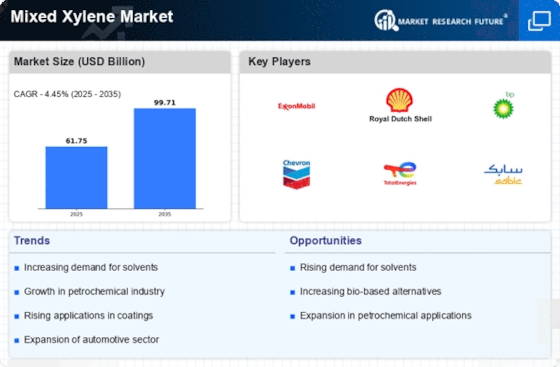Top Industry Leaders in the Mixed Xylene Market
 The mixed xylene market, this aromatic cocktail, a mixture of three isomers - ortho-, meta-, and para-xylene - serves as a critical raw material for diverse industries, from chemicals and plastics to paints and gasoline. Amidst this bustling market, competition is fierce, with both established giants and nimble players vying for dominance. Let's delve deeper into the strategies shaping this landscape, the factors influencing market share, and the recent developments keeping this market exciting.
The mixed xylene market, this aromatic cocktail, a mixture of three isomers - ortho-, meta-, and para-xylene - serves as a critical raw material for diverse industries, from chemicals and plastics to paints and gasoline. Amidst this bustling market, competition is fierce, with both established giants and nimble players vying for dominance. Let's delve deeper into the strategies shaping this landscape, the factors influencing market share, and the recent developments keeping this market exciting.
Key Strategies Adopted by Leading Players:
-
Product Diversification: Leading players like ExxonMobil and Sinopec Yangzi Petrochemical are expanding their offerings beyond solvent-grade xylene to provide isomer-specific grades, catering to distinct needs in downstream industries like polyester production. -
Technological Advancements: Companies like BP and PTT Aromatics & Refining are investing in innovative separation and purification technologies to improve xylene purity and optimize production processes, leading to cost-efficiency and enhanced product quality. -
Vertical Integration: Integrating upstream into crude oil refining and downstream into derivative production gives players like Formosa Chemicals & Fibre greater control over the supply chain and potentially higher profit margins. -
Geographical Expansion: Emerging markets like China and India are witnessing robust demand growth. Players like GS Caltex and SK Energy are strategically expanding their footprints in these regions to capitalize on this potential. -
Sustainability Initiatives: Sustainability is gaining traction, with companies like TOTAL exploring bio-based xylene production methods and reducing environmental footprints through optimized waste management practices.
Factors Shaping Market Share:
-
Cost Competitiveness: Efficient production processes, access to cost-effective feedstock, and geographical advantages influence competitiveness. Players like Flint Hills Resources, with their strategically located refineries, enjoy cost benefits. -
Brand Reputation: Established brands like Nippon Petroleum Refining and ExxonMobil command trust due to their proven track record of quality and reliable supply, giving them an edge in securing valuable contracts. -
Product Portfolio Versatility: Companies offering a range of xylene grades and derivative products like paraxylene, a key precursor for polyester, attract a wider customer base and gain market share, like Chevron Phillips Chemical Company. -
Geographical Presence: A strong presence in key demand regions, particularly Asia-Pacific, is crucial. Companies like SK Energy, with extensive operations in this region, are well-positioned to capitalize on market growth. -
Sustainability Commitment: Implementing sustainable practices and offering bio-based or recycled xylene options can resonate with environmentally conscious consumers and businesses, giving companies like TOTAL a potential edge.
Key Companies in the mixed xylene market include
- Flint Hills Resources, LLC
- GS Caltex Corporation
- Exxon Mobil Corporation
- Chevron Phillips Chemical Company LLC
- TOTAL S.A.
- LOTTE Chemical Corporation
- Idemitsu Kosan Co., Ltd.
- Royal Dutch Shell plc
- China Petroleum & Chemical Corporation
- China National Petroleum Corporation
- SK chemical Co., Ltd.
- YPF Sociedad Anónima
Recent Developments
October 2023: China strengthens environmental regulations on petrochemical production, prompting companies like ExxonMobil to invest in cleaner xylene production methods to comply and maintain market access.
November 2023: Increasing demand for sustainable packaging solutions leads to a surge in demand for bio-based xylene from companies like TOTAL, creating a new growth segment in the market.
December 2023: Despite holiday season slowdowns, the mixed xylene market experiences steady growth, driven by continued demand from the polyester and automotive industries.










